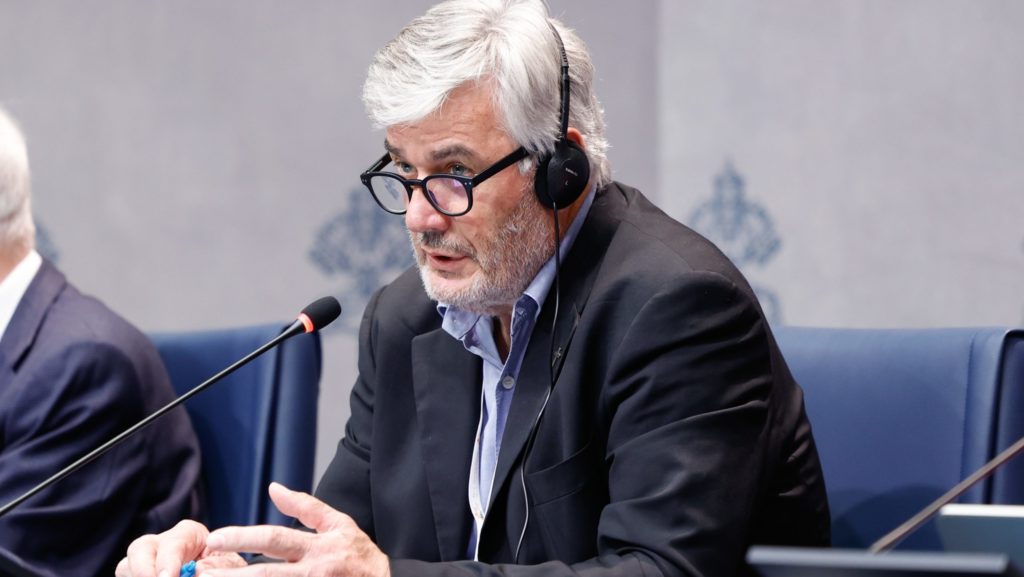As the pope’s Synod of Bishops on Synodality breaches the halfway point, participants are now debating the “doctrinal competency” of national bishops’ conferences, loosely meaning their ability to adapt matters of doctrine to their local context.
Speaking to journalists during an Oct. 16 press briefing on the synod, Italian layman Paolo Ruffini, prefect of the Vatican’s Dicastery for Communications, said current discussion topics include the relationship between local churches, the need for communion in and among bishops’ conferences, and the possibility of “returning doctrinal competency” to episcopal conferences.
He said discussion is also touching on the general role of episcopal conferences at all levels, and the need to preserve the unity of the church amid differences.
Speaking at Wednesday’s press briefing were several canonical and theological expert consultants at the synod, who are tasked with identifying and summarizing areas of consensus, among other things.
Among them was Italian Father Dario Vitali, a priest of the Diocese of Velletri-Segni and coordinator of the theological experts for the Synod of Bishops on Synodality. He holds a doctorate in ecclesiology and is a professor of ecclesiology at the Pontifical Gregorian University.
Asked to expand on the specific issue of the doctrinal competence of bishops’ conferences and what that might look like concretely, Vitali said that earlier that morning, “this issue got a lot of attention in the synod hall.”
“On all sides what was expressed was either the desire for progress in this regard, or fear of going in this direction,” he said.
Doctrinal competency for episcopal conferences has long been a point of debate in Catholic theological circles, with advocates arguing that such contextualization is necessary in order for local Catholics to understand and live the Church’s doctrines, while opponents have argued that giving them too much room for interpretation could lead to deviations and misinterpretations.
In May 1998 Pope John Paul II published two documents – his motu proprio Apostolos Suos and an accompanying apostolic letter Ad Tuendam Fidem – which essentially took all teaching authority away from episcopal conferences, including doctrinal competency.
Though published by John Paul II, those letters were largely the work of then-Cardinal Joseph Ratzinger, at the time prefect of the Congregation for the Doctrine of the Faith, and were a bid to cement the unity of the Church’s body of magisterial teaching.
In his remarks Wednesday, Vitali noted that while Apostolos Suos “basically took all competencies away from episcopal conferences, leaving them as a pastoral entity,” paragraph 21 of the document maintains a certain level of “doctrinal competence.”
Paragraph 21 of the text states that, “The joint exercise of the episcopal ministry also involves the teaching office.”
“Although they do not enjoy infallible teaching authority, the Bishops in communion with the head and members of the college…are authentic teachers and instructors of the faith for the faithful entrusted to their care,” it says.
It notes that the Code of Canon Law itself recognizes “some areas of doctrinal competence of the Conferences of Bishops,” such as the issuance of catechisms for the local church, and the approval of translations and editions of sacred texts, including scripture, with approval from Rome.
Vitali said this passage “does not mean [the bishops’ conference] has the ability to develop dogmas, no, but it means that concretely, in the context in which an ecclesial conference finds itself, it can significantly adapt, as was established in the Second Vatican Council, the language to that context and offer responses to the problems that arise from that context.”
He noted that the doctrinal competency of episcopal conferences was also included in Pope Francis’s 2022 apostolic constitution Predicatae Evangelium when it spoke of “a healthy decentralization.”
This decentralization, Vitali said, implies that “some competencies must be returned to the episcopal conferences on aspects that they know well.”
“So, this is a particularly important provision, but there is the obligation, and I feel it is important to remind you of this as a theologian, that bishops have competence for everything that is related to doctrine,” he said.
Vitali said the structure of the Church is pyramidal and as such, “a lot of matters are reserved to the pope, this is in order to preserve unity, but each bishop in his church can address all matters and he has the duty, not only the ability, to deal with all matters for the benefit of his faithful.”
“Bishops conferences or any organism at the level of church groupings,” can address any matter that requires attention, he said, saying, “it’s clear that at this point there is also the possibility of formulating and sharing a proposal in a doctrinal key that then has fallout of a pastoral character in the accompaniment of people on a journey.”
While the synod experts will make concrete proposals on some specific points, such as changes in Canon Law for the provision of pastoral councils in parishes and other similar structures, that are expected to be included in the synod’s final concluding document, and it is presumed these proposals will also touch on the matter of doctrinal competency for bishops’ conferences.
Should Pope Francis move to return broader doctrinal competency to local episcopal conferences, it would likely be seen by critics as the reversal of another aspect of Benedict XVI’s legacy.
However, if there is a lack of a clear consensus on the matter, it is unclear what proposals regarding doctrinal competency will be made and whether the pope would take any action, or request further study.

